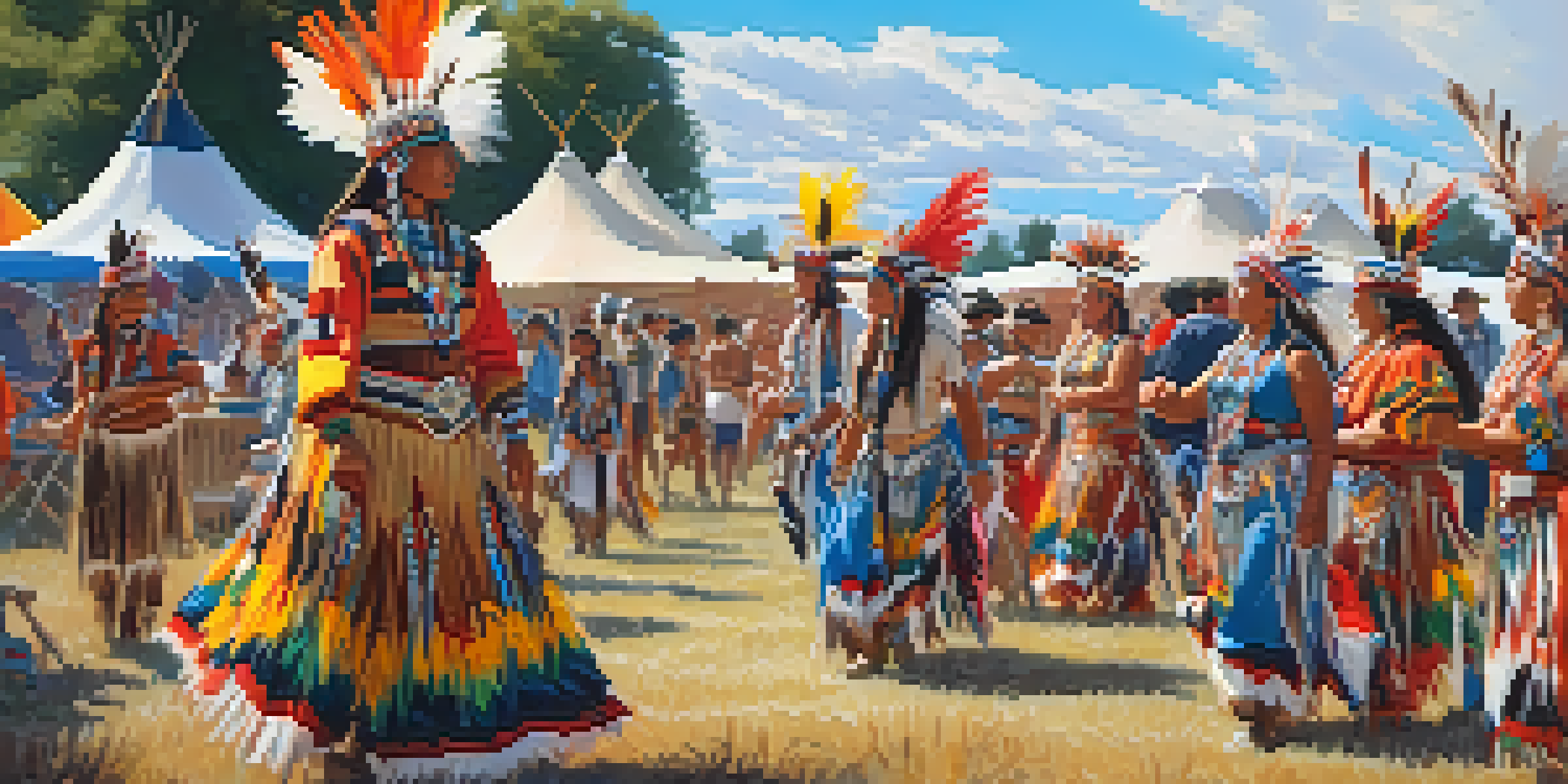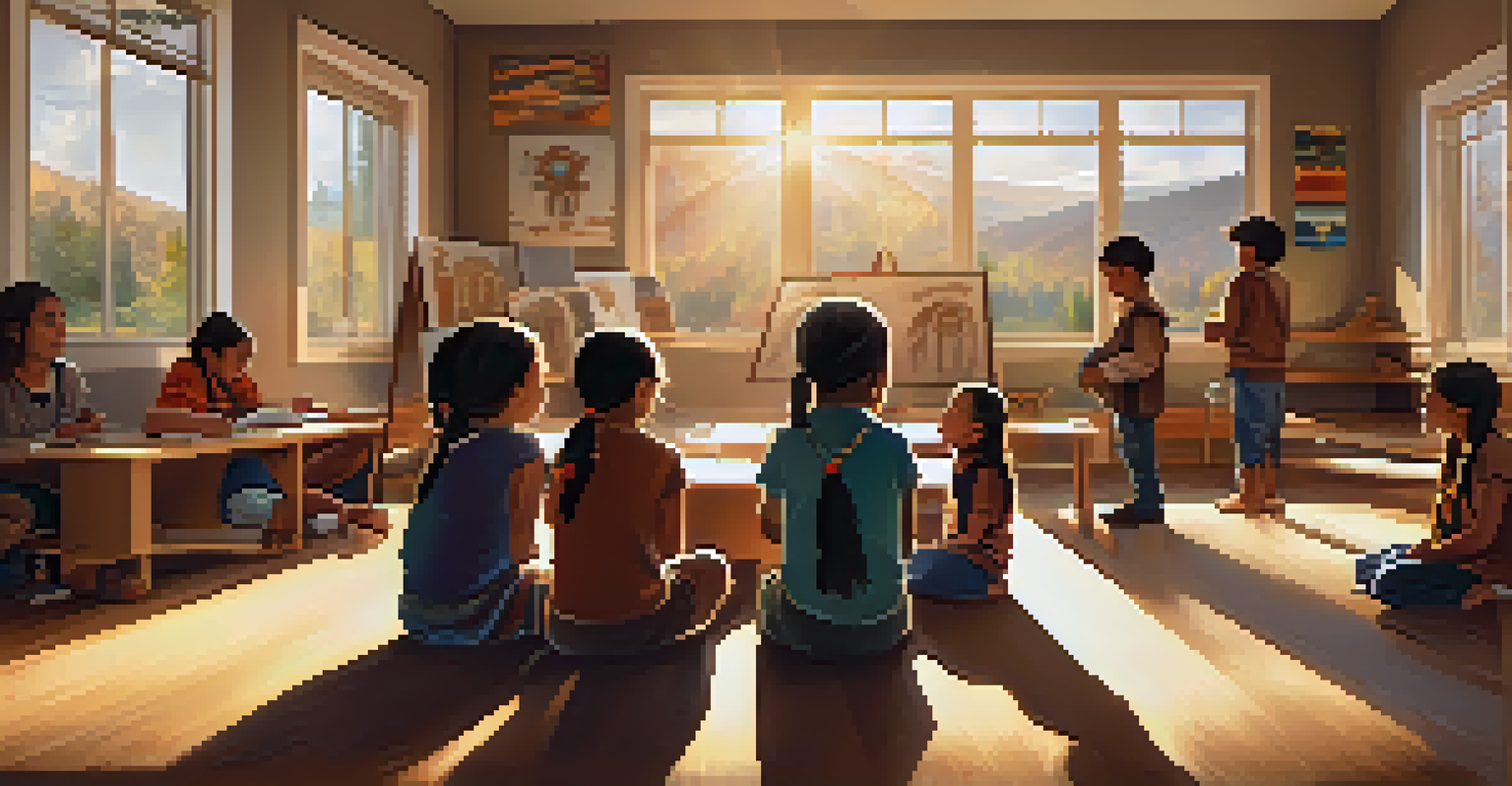Preserving Native American Heritage in Sacramento Today

The Importance of Native American Heritage in Sacramento
Sacramento is home to a rich tapestry of Native American cultures, primarily influenced by the Nisenan, Miwok, and Wintu tribes. These communities have deep historical roots in the area, and their stories shape the identity of Sacramento today. Recognizing this heritage is crucial not only for cultural pride but also for fostering respect and understanding in a diverse society.
Preservation of one's own culture does not require contempt or disrespect for other cultures.
The importance of preserving Native American heritage extends beyond historical significance; it informs contemporary issues such as land rights, cultural representation, and community engagement. The legacy of these tribes provides valuable lessons in sustainability, resilience, and harmony with nature. By acknowledging their contributions, Sacramento can promote inclusivity and celebrate its diverse cultural landscape.
Efforts to honor this heritage are not just about remembrance; they are about ensuring that Native voices are heard and valued. This can be achieved through education, cultural events, and partnerships that amplify Native perspectives in civic discussions. In this way, Sacramento can actively participate in the preservation of a vital part of its history.
Current Initiatives Supporting Native American Communities
Various organizations in Sacramento are dedicated to supporting Native American communities through cultural programs and advocacy. Institutions like the Sacramento Native American Health Center provide essential services while also promoting cultural education and awareness. These initiatives play a crucial role in the well-being of Native populations and help bridge gaps between communities.

Events such as the annual Sacramento Powwow celebrate Native culture through dance, music, and art, drawing in participants from across the state. These gatherings foster a sense of community and pride, offering a platform for Native artists and performers to showcase their talents. They also provide a space for non-Native residents to engage with and learn about these rich traditions.
Cultural Heritage Shapes Identity
Sacramento's rich Native American heritage, influenced by tribes like the Nisenan and Miwok, is essential for fostering cultural pride and respect in the community.
Additionally, local schools are incorporating Native American history and culture into their curriculum, helping to educate young people about the significance of these communities. By integrating Indigenous perspectives into education, Sacramento is laying the groundwork for future generations to appreciate and respect Native American heritage.
Challenges Faced by Native American Communities Today
Despite ongoing efforts, Native American communities in Sacramento face significant challenges. Issues such as economic disparities, health inequalities, and cultural erasure threaten their heritage and well-being. These challenges are compounded by historical injustices and systemic barriers that continue to affect Indigenous populations today.
The education of our children must not be the education of a single culture but rather the education of all cultures.
Access to education, healthcare, and social services remains a pressing concern for many Native Americans in the area. Many community members struggle with high rates of poverty and unemployment, which can hinder their ability to participate fully in cultural preservation efforts. Addressing these disparities requires a concerted effort by local government and organizations to provide support and resources.
Moreover, the threat of cultural appropriation remains a significant concern. As interest in Native American culture grows, it is essential to ensure that these traditions are respected and represented authentically. This calls for collaboration between Native communities and non-Native entities to create spaces that honor Indigenous voices and perspectives.
The Role of Education in Cultural Preservation
Education is a powerful tool in the preservation of Native American heritage. By teaching the history, languages, and traditions of local tribes, schools can cultivate a deeper understanding and appreciation among students. This educational approach not only benefits Native youth but also enriches the broader community by fostering mutual respect.
Programs that include Native American literature, history, and art can help dispel stereotypes and misconceptions. When students learn about the complexities of Indigenous cultures, they are more likely to value and respect these communities. Engaging with Native storytellers and elders can also provide invaluable insights and perspectives that textbooks alone cannot convey.
Community Engagement is Key
Active participation in cultural events and partnerships can significantly enhance understanding and support for Native American heritage preservation.
Additionally, partnerships between schools and Native organizations can enhance educational offerings. Workshops, cultural exchanges, and field trips to local heritage sites can provide hands-on learning experiences. This collaborative approach ensures that cultural preservation is a shared responsibility, involving both Native and non-Native participants.
Community Engagement: A Path to Preservation
Community engagement plays a vital role in preserving Native American heritage in Sacramento. Initiatives that encourage dialogue and collaboration between Indigenous and non-Indigenous residents can foster understanding and support for cultural preservation efforts. Community events, such as cultural festivals and workshops, offer opportunities for residents to learn about and celebrate Native traditions.
Involving local businesses and organizations can also enhance these efforts. Sponsorships and partnerships can provide necessary resources for cultural events and educational programs. When businesses recognize the importance of supporting Native heritage, they contribute to the economic sustainability of Indigenous communities while enriching Sacramento’s cultural fabric.
Moreover, social media and digital platforms are powerful tools for raising awareness and engaging a wider audience. Native American activists and organizations can share their stories, traditions, and initiatives online, reaching individuals who may not otherwise engage with Indigenous culture. This digital presence helps to keep the conversation alive and encourages ongoing support for heritage preservation.
Cultural Events: Celebrating Native American Traditions
Cultural events are essential for celebrating and preserving Native American traditions in Sacramento. Events like the Sacramento Powwow not only honor Native heritage but also serve as a gathering place for community members and allies. These occasions highlight the vibrancy of Indigenous cultures through dance, music, art, and storytelling.
Participation in these events allows both Native and non-Native individuals to connect with the culture on a personal level. For many participants, it's an opportunity to learn about traditional practices, such as weaving, drumming, and traditional cooking. These hands-on experiences foster appreciation and respect for Native American heritage and its significance.
Education Promotes Respect
Incorporating Native American history and culture into school curriculums helps dispel stereotypes and fosters mutual respect among students.
Moreover, cultural events often include educational components, such as workshops and presentations that delve into the histories and issues faced by Native communities. By creating space for these conversations, Sacramento can promote a deeper understanding of the ongoing journey of Indigenous peoples. Ultimately, these celebrations strengthen community ties and ensure that Native traditions are shared and preserved for future generations.
The Future of Native American Heritage in Sacramento
Looking ahead, the future of Native American heritage in Sacramento relies on continued advocacy and community involvement. As awareness of Indigenous issues grows, there is an opportunity for residents to actively participate in preserving this rich cultural heritage. Collaboration between Native communities, local government, and educational institutions will be key in shaping a positive future.
Sustainable practices, such as land stewardship and environmental preservation, can be integrated into community development plans. By respecting the land and the traditions tied to it, Sacramento can honor the teachings of Native peoples. This holistic approach benefits not only Indigenous communities but also enhances the overall quality of life for all residents.

Ultimately, the preservation of Native American heritage in Sacramento is a shared responsibility. By standing together in support of these efforts, community members can play a vital role in ensuring that Indigenous cultures thrive. Together, they can create a future where Native American heritage is celebrated, respected, and woven into the very fabric of Sacramento.